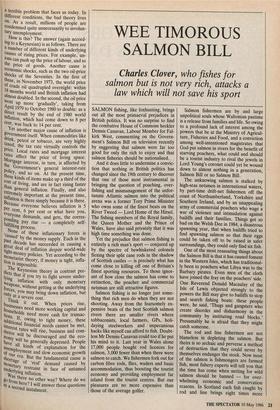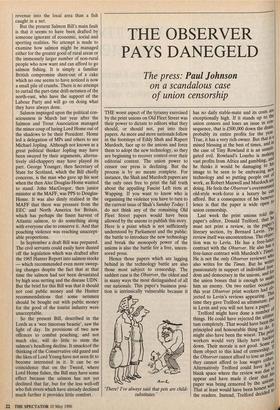WEE TIMOROUS SALMON BILL
Charles Clover, who fishes for
salmon but is not very rich, attacks a law which will not save his sport
SALMON fishing, like foxhunting, brings out all the most primaeval prejudices in British politics. It was no surprise to find the combative House of Commons heckler Dennis Canavan, Labour Member for Fal- kirk West, commenting on the Govern- ment's Salmon Bill on television recently by suggesting that salmon were far too good for only the rich to enjoy and that salmon fisheries should be nationalised.
And it does little to undermine a convic- tion that nothing in British politics has changed since the 19th century to discover that one of those most instrumental in bringing the question of poaching, over- fishing and mismanagement of the unfor- tunate Atlantic salmon into the political arena was a former Tory Prime Minister who owns some of the finest beats on the River Tweed — Lord Home of the Hirsel. The fishing members of the Royal family, the Queen Mother and the Prince of Wales, have also said privately that it was high time something was done. Yet the prejudice that salmon fishing is entirely a rich man's sport — conjured up by the spectre of bewhiskered colonels flexing their split cane rods in the shadow of Scottish castles — is precisely what has come close to killing off one of Britain's finest sporting resources. To those ignor- ant of how close the salmon has come to extinction, the poacher and commercial netsman are still attractive figures.
Salmon fishing is no longer just some- thing that rich men do when they are not shooting. Away from the fearsomely ex- pensive beats of the best Scottish salmon rivers there are smaller rivers where tobbaconists, local farmers, GPs, holi- daying steelworkers and impecunious hacks like myself can afford to fish. Doubt- less Mr Dennis Canavan could too if he put his mind to it. Last year in Wales alone 17,000 people bought rod licences for salmon, 3,000 fewer than when there were salmon to catch. We fishermen fork out for carbon fibre rods, flies, waders and basic accommodation, thus boosting the tourist economy and providing employment far inland from the tourist centres. But our pleasures are no more expensive than those of the average golfer. Salmon fishermen are by and large unpolitical souls whose Waltonian pastime is a release from families and life. So owing to a profound lack of interest among the powers that be at the Ministry of Agricul- ture, Fisheries and Food, and a conviction among well-intentioned magistrates that God put salmon in rivers for the benefit of starving poachers, what could and should be a tourist industry to rival the jewels in Lord Young's coronet could yet be wound down to almost nothing in a generation, Salmon Bill or no Salmon Bill.
The unknowing salmon is stalked by high-seas netsmen in international waters, by part-time drift-net fishermen off the coast of Northumberland, Yorkshire and Southern Ireland, and by an unappealing army of commercial poachers who wage a war of violence and intimidation against bailiffs and their families. Things got so bad on the Welsh Dee in 1984, a disastrous spawning year, that when bailiffs tried to find spawning salmon so that their eggs could be taken off to be raised in safer surroundings, they could only find six fish.
One of the most reassuring things about the Salmon Bill is that it has caused foment in the Western Isles, which has traditional- ly been to poachers what Libya was to the Barbary pirates. Even men of the cloth have joined the fray on the poachers' side. One Reverend Donald Macaulay of the Isle of Lewis objected strongly to the powers the Bill may give to bailiffs to stop and search fishing boats: these people were, he said, 'Thugs and gangsters who create disorder and disharmony in the community by instituting road blocks.' Presumably he is afraid that they might catch someone.
The rod and line fishermen are not blameless in depleting the salmon. But theirs is so archaic and perverse a method of destruction that they could never by themselves endanger the stock. Now most of the salmon is fishmongers are farmed fish, most fishery experts will tell you that the time has come when netting for wild salmon should be banned — for over- whelming economic and conservation reasons. In Scotland each fish caught by rod and line brings eight times more revenue into the local area than a fish caught in a net.
But the present Salmon Bill's main fault is that it seems to have been drafted by someone ignorant of economic, social and sporting realities. No attempt is made to examine how salmon might be managed either for the greater good of rural areas or the immensely larger number of non-rural people who now want and can afford to go salmon fishing. It is simply a familiar British compromise share-out of a cake which no one seems to have noticed is now a small pile of crumbs. There is no attempt to curtail the part-time drift-netsmen of the north-east, who have the support of the Labour Party and will go on doing what they have always done.
Salmon impinged upon the political con- sciousness in March last year after the Salmon and Trout Association managed the minor coup of luring Lord Home out of the shadows to be their President. Home led a delegation of MPs and others to see Michael Jopling. Although not known as a great political thinker Jopling may have been swayed by their arguments, alterna- tively old-chappery may have played its part. George Younger, then Secretary of State for Scotland, which the Bill chiefly concerns, is the man who gave up his seat when the then Alec Douglas-Home wanted to stand. John MacGregor, then junior minister at the MAFF, was PPS to Douglas- Home. It was also dimly realised in the MAFF that there was pressure from the EEC and North America for Britain, which has perhaps the finest harvest of Atlantic salmon, to do something along with everyone else to conserve it. And that poaching violence was reaching unaccept- able proportions.
In September a draft Bill was prepared. The civil servants could easily have dusted off the legislation which was drafted after the 1965 Hunter Report into salmon stocks — which recommended even more sweep- ing changes despite the fact that at that time the salmon had not been devastated by high seas netting and the disease UDN. But the brief for this Bill was that it should not cost public money and the Hunter recommendations that some netsmen should be bought out with public money for the good of the tourist industry were unacceptable.
So the present Bill, described in the Lords as a 'wee timorous beastie', saw the light of day. Its provisions of two new offences to combat poaching, and not much else, will do little to stem the salmon's headlong decline. It smacksof the thinking of the Conservative old guard and the likes of Lord Young have not seen fit to become interested in it. It can be no coincidence that on the Tweed, where Lord Home fishes, the Bill may have some effect because the salmon has not yet declined that far, but for the less well-off who fish rivers which have already declined much further it provides little comfort.



























































 Previous page
Previous page